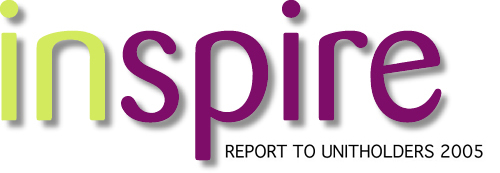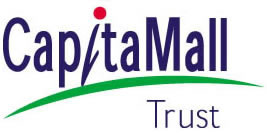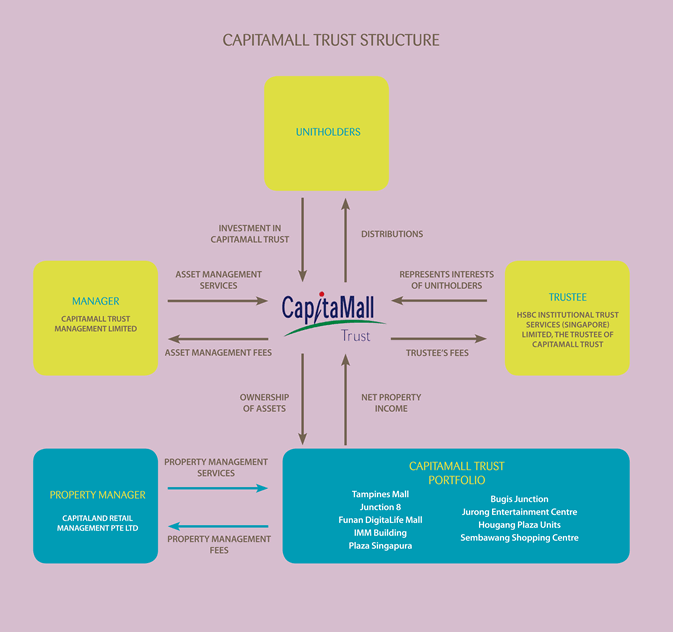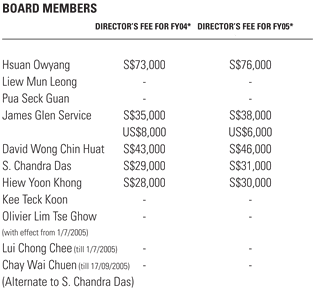

INTRODUCTION | INGENIOUS VALUE CREATION & GROWTH STRATEGIES | IN CONVERSATION | INSIGHTS INTO GROWTH | INSPIRING LEADERSHIP
INTEGRATING PEOPLE & SOCIETY | INVESTOR RELATIONS | IN REVIEW | INCREASING DOMINANCE | IN DETAILS

CORPORATE GOVERNANCE
Good corporate governance has always been the priority of CapitaMall Trust Management Limited (the Manager), the Manager of CapitaMall Trust (CMT). The Manager recognises that an effective corporate governance culture is critical to the performance of the Manager and, consequently, the success of CMT. As such, corporate governance will remain at the top of the Manager’s agenda.

Pursuant to this agenda, the Manager has adopted a comprehensive corporate governance framework that meets best practice principles. In particular, the Manager has an obligation to act honestly, with due care and diligence, and in the best interests of Unitholders. This obligation ties in with the Manager’s prime responsibility in managing the assets and liabilities of CMT for the benefit of Unitholders, and the Manager will endeavour to continue enhancing returns to Unitholders.
The Manager of CMT
The Manager has general powers of management over the assets of CMT.
The Manager’s main responsibility is to manage the assets and liabilities of CMT for the benefit of Unitholders. The Manager will manage the assets of CMT with a focus on generating rental income and, if appropriate, increasing CMT’s assets over time so as to enhance the returns from the investments of CMT and ultimately the distributions and total return to Unitholders.
The primary role of the Manager is to set the strategic direction of CMT and make recommendations to HSBC Institutional Trust Services (Singapore) Limited (the Trustee) as trustee of CMT on the acquisition, divestment or enhancement of the assets of CMT in accordance with its stated investment strategy. The research, evaluation and analysis required for this purpose is co-ordinated and carried out by the Manager. The Manager is also responsible for the risk management of CMT.
Other functions and responsibilities of the Manager include:
-
Using its best endeavours to carry on and conduct its business in a proper and efficient manner and to conduct all transactions with, or on behalf of, CMT at arm’s length.
-
Preparing property plans on an annual basis for review by the Directors of the Manager which may contain proposals and forecasts on net income, capital expenditure, sales and valuations, explanation of major variances to previous forecasts, written commentary on key issues and underlying assumptions on rental rates, inflation, moving annual turnover, occupancy costs and any other relevant assumptions. The purpose of these plans is to explain the performance of CMT’s assets.
-
• Ensuring compliance with the applicable provisions of the Companies Act and the Securities and Futures Act of Singapore, as well as other relevant legislation, the Listing Manual (the Listing Manual) of Singapore Exchange Securities Trading Limited (SGX-ST), the Code on Collective Investment Schemes (the CIS Code) issued by the Monetary Authority of Singapore (MAS), the Trust Deed, the tax ruling issued by the Inland Revenue Authority of Singapore on the taxation of CMT and its Unitholders and all relevant contracts.
-
Attending to all regular communications with Unitholders.
-
Supervising CapitaLand Retail Management Pte Ltd (the Property Manager), which performs the day-to-day property management functions (including leasing, accounting, marketing, promotion, co-ordination, project management and property management) at the CMT malls namely, Tampines Mall, Junction 8, Funan DigitaLife Mall, IMM Building, Plaza Singapura, Bugis Junction, Jurong Entertainment Centre, Hougang Plaza Units and Sembawang Shopping Centre pursuant to the property management agreements.
As CMT is externally managed by the Manager, it has no personnel. The Manager appoints experienced and well-qualified management to handle its day-to-day operations. All Directors and employees of the Manager are remunerated by the Manager, and not by CMT.
CapitaMall Trust Management Limited is appointed as manager of CMT in accordance with the terms of the Trust Deed dated 29 October 2001 as amended by the First Supplemental Deed dated 26 December 2001, the Second Supplemental Deed dated 28 June 2002, the Amending and Restating Deed dated 29 April 2003, the Fourth Supplemental Deed dated 18 August 2003, the Second Amending and Restating Deed dated 9 July 2004, the Sixth Supplemental Deed dated 18 March 2005, the Seventh Supplemental Deed dated 21 July 2005 and the Eighth Supplemental Deed dated 13 October 2005 (the Trust Deed). The Trust Deed outlines certain circumstances under which the Manager can be retired in favour of a corporation approved by the Trustee or be removed by notice given in writing from the Trustee upon the occurrence of certain events, including by a special extraordinary resolution passed at a meeting of Unitholders duly convened and held in accordance with the provisions of the Trust Deed by a vote representing not less than 75 percent of all Units in issue entitled to vote on the matter.
Under the Guidelines for Property Funds issued by MAS, an appendix to the Code on Collective Investment Schemes, the Trust Deed is required to be amended by 20 April 2006 to provide for the following:
a) The Manager may be removed by way of a resolution passed by a simple majority of participants present and voting at a general meeting, with no participant being disenfranchised; and
b) A general meeting may be convened at the request in writing of not less than 50 participants or participants representing not less than 10 percent of the issued Units of the property fund.
Board of Directors of the Manager
The Board of Directors of the Manager (the Board) is responsible for the overall management and the corporate governance of the Manager and CMT, including establishing goals for management and monitoring the achievement of these goals.
All Board members participate in matters relating to corporate governance, business operations and risks, financial performance and the nomination and review of Directors. The Board has established a framework for the management of the Manager and CMT, including a system of internal controls and a business risk management process.
The Board meets regularly to discuss and review the Manager’s key activities, including its business strategies and policies for CMT. Board meetings are scheduled in advance, and are held at least once every quarter, to deliberate on the strategic policies of CMT, including any significant acquisitions and disposals, the annual budget, review the performance of the business, review the financial performance of the Manager and CMT and approve the release of the quarterly, half-yearly and full-year results. The Board also reviews the risks to the assets of CMT and acts upon any comments from the auditors of CMT. Additional Board meetings are held, where necessary, to address significant transactions or issues.
The Board has adopted a set of internal controls which sets out approval limits for capital expenditure, investments and divestments, bank borrowings and cheque signatories’ arrangements at Board level, amongst others. Appropriate delegations of authority and approval sub-limits are also provided at management level to facilitate operational efficiency.
Changes to regulations, policies and accounting standards are monitored closely. To keep pace with regulatory changes, where these changes have an important and significant bearing on CMT and its disclosure obligations, the Directors are briefed by management during Board meetings, at specially convened sessions or via circulation of Board papers. Management also provides the Board with complete and adequate information in a timely manner through regular updates on financial results, market trends and business developments.
Board Composition
Presently, the Board consists of nine members of which three are Independent Non-Executive Directors. The Chairman of the Board is Mr Hsuan Owyang. The sole Executive Director is Mr Pua Seck Guan, the Chief Executive Officer.
The composition of the Board is determined using the following principles:
-
The Chairman of the Board should be an Independent Non-Executive Director;
-
The Board should comprise Directors with a broad range of commercial experience, including expertise in funds management, the property industry and in the banking and legal fields; and
-
The Board should comprise at least three Independent Directors.
The composition of the Board is reviewed regularly to ensure that the Board has the appropriate size and mix of expertise and experience.
Four Board meetings were held during the year. The attendance at the Board meetings held in 2005 is set out on page 51.
Chairman and Chief Executive Officer
The positions of Chairman and Chief Executive Officer are held by two people in order to maintain an effective oversight and segregation of duties.
The Chairman ensures that the members of the Board work together with management with integrity, competency and moral authority, and engages management in constructive debate on strategy, business operations and enterprise risks. The Chief Executive Officer has full executive responsibilities over the business directions and operational decisions of managing CMT.
The majority of the Board members are non-executive with one-third of the Board being independent of management. This enables management to benefit from their external and objective perspective of issues that are brought before the Board. It also enables the Board to interact and work with management through a healthy exchange of ideas and views to help shape the strategic process. This, together with a clear separation of the roles of the Chairman and the Chief Executive Officer, provides a healthy professional relationship between the Board and management with clarity of roles and robust deliberation on the business activities of CMT.
Newly appointed Directors are given briefings by management on the business activities of CMT and its strategic directions.
The Board will take independent professional advice when it deems it necessary for the proper and efficient discharge of its responsibilities. The Company Secretary will give the Board the necessary assistance and is also responsible for ensuring that Board procedures are followed and that the applicable laws and regulations are complied with. In addition, the Company Secretary will also attend all Board meetings.
Board Remuneration
The remuneration of Directors is paid by the Manager, and not by CMT.
The remuneration of Directors for the year ended 31 December 2005 is shown in the table below:

The Board has established various committees to assist it in discharging its responsibilities. These committees are listed below.